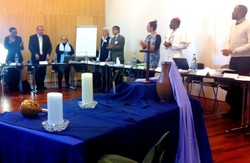The committee that advises World Council of Churches (WCC) governing bodies on promoting ecumenical learning has ended its February 2015 meeting with a series of recommendations to ensure a vibrant study environment.
During a three-day meeting from 18 to 20 February, the Commission on Education and Ecumenical Formation (CEEF) noted barriers to better ecumenical education, including a general lack of awareness about ecumenism, the need to strengthen commitment to ecumenical education, as well as the urgent need to provide a broader range of ecumenical resources.
The commission, which meets every second year, will present its recommendations to the WCC Executive Committee later in the year. It reports on three areas of work: networking, inclusiveness and regional work and relations.
Develop better learning environments
Among the committee’s decisions on networking, it decided to form a task group to strengthen global ecumenical education and formation. It also took steps towards creating a global network of teachers of ecumenism.
In relation to inclusiveness, the committee will ensure participation from youth, people with disabilities and indigenous peoples to help design content and methodology for ecumenical education and formation programmes.
On the question of regional work and relations, the commission committed itself to promote ecumenical education, especially in regions suffering conflict and violence perpetrated in the name of religion.
Speaking after the meeting, CEEF vice-moderator Dr Esther Mombo said the group was keen, expressive and engaged, and would make sound recommendations to the WCC.
The proposals will focus on harvesting the work of the groups representing five regions where ecumenical formation was happening, as well as the work of the Ecumenical Institute in Bossey, near Geneva, Switzerland, the development of networks of ecumenical theological institutions around the world (ecumenical theological education) and continuing ecumenical formation. Two overlapping themes are youth and spiritual life.
“Both for teaching the students and for re-energizing the leadership where engagement is waning, the significance of the ecumenical movement is in forming the next generation of leadership,” Mombo said.
Better ways of including the marginalized are needed
Moderator of the CEEF Dr Rudolf von Sinner said that more work is needed to include young people and excluded groups in a meaningful way as full members in the ecumenical movement.
It was important to pay attention to how regional institutions and networks could better work together with the WCC, he said. Von Sinner added that the commission has reflected on how the challenge of limited resources can be addressed to improve the work of regional organizations.
Central to the process are submissions from groups in the regions, where councils of churches and theological institutions are supported by the churches. The regional groups most closely felt the lack of inclusiveness and pluralism and the challenges of relations between faiths.
“The regions are closer to the churches and are the ones who second students to study so that real action happens at a regional level. They meet many more people and have that geographical closeness. The numbers and presence are strong,” Mombo said.
A theology teacher in “post-denominational” China, Rev. Dr Ge Wen, is on the commission, and he commented outside the meeting that the committee itself represents a pilgrimage. “Pilgrimage for justice and peace” is a vision that was promoted by the WCC 10th Assembly in 2013.
“We learn from each other and remember each other, and we try to achieve solidarity and understand the situation of churches in other countries, and this is in itself already a witness. I would like to see more inclusiveness in the ecumenical movement. It’s not about an elite phenomenon but making it a popular movement at the grassroots level.
"The churches in China are situated in multicultural, multi-ethnic and multi-religious contexts. In my seminary, I try to teach students that seeking the unity of churches is obeying the Lord's commandment in order to bear witness to his perfect love," said Wen.
Ecumenical formation is important for raising awareness and for including youth, people with disabilities and indigenous peoples to enlarge this inclusiveness. “We should not forget them but read scripture from their perspective. We need to seek illumination to nurture a Christ-like life,” he said.

